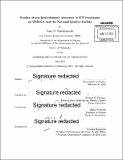Studies of non-hydrodynamic processes in ICF implosions on OMEGA and the National Ignition Facility
Author(s)
Rinderknecht, Hans G
DownloadFull printable version (58.06Mb)
Other Contributors
Massachusetts Institute of Technology. Department of Physics.
Advisor
Richard D. Petrasso and Miklos Porkolab.
Terms of use
Metadata
Show full item recordAbstract
Ion kinetic effects are expected to modify plasma dynamics when ion mean-free-paths and collision times become comparable to the scale sizes of the plasma. Such conditions arise during the shock convergence phase of inertial confinement fusion (ICF) implosions, when they may modify the compression and ignition of the fuel from the evolution predicted by main-line hydrodynamic simulations. Kinetic plasma dynamics relevant to ICF implosions have been studied experimentally using strongly-shocked ICF implosions containing multiple ion species, and diagnosed using both new and established nuclear diagnostics and techniques. Implosions of deuterated plastic shells filled with equivalent-mass-density mixtures of deuterium and 3He gas have demonstrated for the first time ion diffusive mixing of the fuel and shell material through observations of the D3He-proton and DD-neutron yields. Implosions with initially separated populations of D in the shell and 3He in the gas produced D3He-fusion from the mixed region on par with implosions filled with equimolar D3 He fuel and an order of magnitude larger than is produced by hydrodynamic models of fuel/shell mix. An extensive survey of kinetic mix- and yield-generation mechanisms and their signatures in nuclear diagnostics establishes ion diffusion as the best candidate to explain these observations. A series of shock-driven implosions of D3He-gas filled glass shells has demonstrated two signatures of significant ion kinetic plasma effects for the first time: ion thermal decoupling and ion species separation. In low-initial gas density implosions, for which the thermal equilibration times were much longer than the burn duration, the burn-averaged ion temperatures were observed to be anomalously invariant with ion species fraction. This behavior has been shown to signify thermal decoupling of the D and 3He ion species between the shock- and fusion-phases. Comprehensive nuclear diagnostic information has been used to infer the burn-averaged deuterium fraction, which was reduced from the expectations of hydrodynamic simulations, the first direct measurement of species separation in an ICF implosion. When corrected for these effects, simulations agreed better with the observed anomalously low nuclear yields. These results have demonstrated the significant modification of ICF-relevant shocked plasmas by kinetic plasma dynamics, motivating further experimental and theoretical investigation of these highly dynamic and poorly understood regimes.
Description
Thesis: Ph. D., Massachusetts Institute of Technology, Department of Physics, 2015. Cataloged from PDF version of thesis. Includes bibliographical references.
Date issued
2015Department
Massachusetts Institute of Technology. Department of PhysicsPublisher
Massachusetts Institute of Technology
Keywords
Physics.